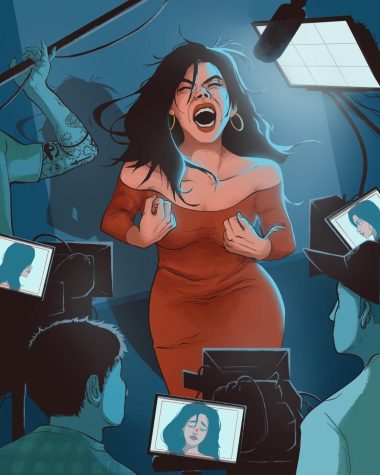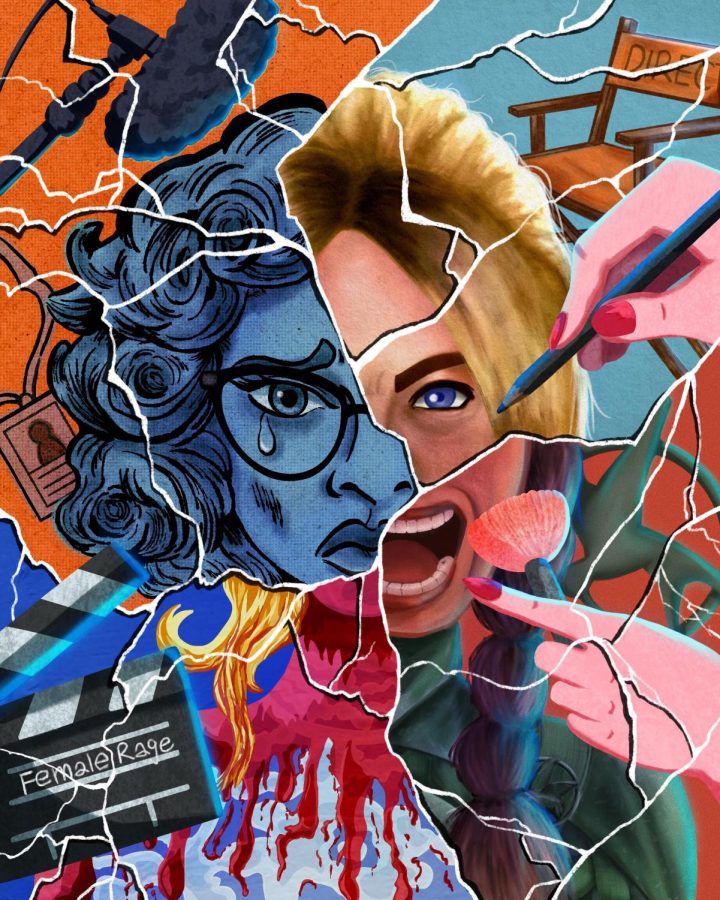Female rage in film
There is nothing quite like an angry woman
Tears creep down the splotchy red cheeks of an unflinching face that hide a racing heart of constant disappointment. The accurate depiction of female rage on screen is long overdue as it has been so often poorly portrayed in Hollywood.
Female rage is more than just getting angry, it’s about getting even. Years of gender roles didn’t allow women to show their anger in the way that men did. Men were viewed as strong and powerful when they yelled or displayed their anger. When women did the same they were viewed as crazy and inconsolable. In movies these women are portrayed as the antagonist and misunderstood by many.
“The act of a woman opening her mouth with volume and assured force, often in complaint, is coded in our minds as ugly,” Rebecca Traister wrote in her book “Good and Mad: Revolutionary Power of Women’s Anger.”
It’s incredibly difficult to capture what it truly feels like and very few directors do it justice. However, when they do get it right, it shakes you to your core. It leaves you feeling unsettled and angry for them. These scenes capture what it looks like to experience this kind of anger. Seeing accurate portrayals of female rage is reassuring in the sense that it validates women’s thoughts. It reminds us that we are allowed to express our anger however we see fit.
In the film, “Ready or Not,” Samara Weaving’s character Grace le Domas is cheated out of a life she was promised by her husband. On the night of their wedding, Grace was determined to win over her husband, Alex le Domas’ incredibly wealthy family by agreeing to play a family tradition. Grace quickly finds out that she is actually a pawn in the family’s twisted ritual. We see her character go from being kind and understanding of her husband’s situation to being angry at what her husband has put her through.
Since she came from the foster system, Grace didn’t understand the life of the super wealthy and through the film we see her grow more resentful towards them. In this scene we see Grace begging for help after running from her in-laws. At this point, her dress is torn and stained with her blood after the many obstacles she had to face to escape. She tries to flag down a passing car for help only to be yelled at by a man in a Maserati — this was the final straw for her as she no longer can keep her anger in.
Her anger is understandable as the family didn’t see her as a human but just a naive pawn in their sick ritual. Grace was ripped from the life she so badly deserved and wanted. This is a sad reality women face, some believe that they are marrying their “prince charming” but end in sad marriages. You can feel her anger after each time she screams, it sits in the pit of your stomach and leaves you feeling unsettled.
I can recall the first time I felt this kind of rage. I was 19 years old and I had been used by a person I trusted. I sat in my car with my best friend as tears and snot streamed down my face as we realized the severity of what had happened. We sat in a dark parking lot and I let out a scream of frustration and sadness. After I wiped my face, I passive-aggressively tried to move on with my life but the only thoughts in my head were anger and spite. I remember feeling alone and trying to find women in different sorts of media experiencing the same. I wanted to feel seen.
In the movie, “Hidden Figures,” Taraji Henson’s character, Katherine Johnson, experiences inequality for being not only a woman but being a woman of color even though she played a vital role in launching an astronaut into space. She persevered through a time of racial injustice and constantly having to prove her intelligence because of her gender. In the scene below, the audience sees her snap, after being reprimanded by her boss for “not being where he needs her to be.”
Henson performs an incredible monologue showing her anger and frustration as she explains to her superior what she has to go through. Even though the film is set in the ‘60s, women are still being discriminated against in the workplace by being paid less than men. The 19th reported that women were still making 77 cents for every dollar their male counterparts made in 2023. This is incredibly frustrating and makes Henson’s character’s monologue even more impactful because these issues continue to persist.
Women have been misrepresented in the movie industry for decades. Films from the past show women exploding over minuscule things like weight gain and not why they are upset about the weight gain. For example, in “Mean Girls” we see Regina George go on a full-blown rampage after finding out Kady Heron was giving her weight-gaining bars. The first assumption is that she’s upset that she gained weight but the real issue is that one of her friends had betrayed her trust.
In the film, “Don’t Worry Darling,” Florence Pugh plays Alice Chambers, a happy housewife in the 1950s. However, as the film plays out we see that she’s stuck in a simulation that her ex-boyfriend put her in. Chambers, whose real last name is Warren, was ripped out of her life as a doctor in modern-day New York City, by her ex-boyfriend Jack. Throughout the movie, everyone made Alice feel like she was crazy and delusional for thinking everything was fake.
It isn’t until the last 20 minutes of the film that she uncovers the truth through a slip-up made by Jack. Alice is angry at Jack for taking away everything she worked for because he was insecure. Women have had to minimize their intelligence for the sake of keeping their partner’s fragile masculinity intact since the dawn of time. Men like Jack can’t bear the thought of their girlfriends being more successful than him. Although women aren’t literally being put into simulations they are still being gaslit by insecure and narcissistic men into thinking they need them.

These are just a few more recent movies that depict female rage, but it’s films like these that help break down the preconceived ideas and stereotypes women have to go through. Women aren’t the fragile things the media used to show, they are strong and deserve to be angry.











